Goat Milk Formula Vs. Cow Milk Formula
This post may contain affiliate links. As an Amazon Associate, I earn from qualifying purchases. Please read my disclosure.Is goat milk formula healthier than cow’s milk formula? What are all of the factors to consider when choosing between goat milk formula vs. cow milk formula? In this comprehensive guide, you’ll learn about the difference between cow and goat milk formula, the pros and cons of each, and how to choose whether to use goat formula vs. cow formula for your baby!
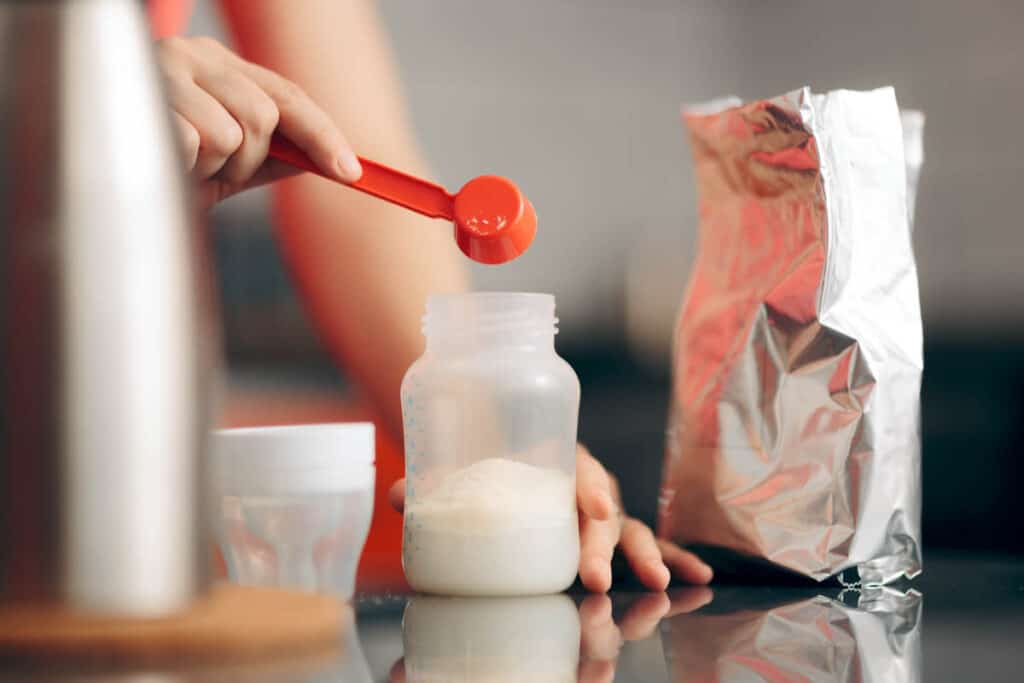
Finding the best baby formula can be a challenge sometimes – and understandably so! There are so many different types of baby formula on the market, it’s so important to find the right formula for your baby – one that they tolerate well, and that has ingredients you can feel good about.
If you’re using formula for any number of totally legitimate reasons: (breastfeeding is too mentally & physically exhausting / painful, your baby is allergic to a protein in your breastmilk, you adopted or had a surrogate, or you need to supplement just because!) – you want to make sure what you’re feeding your babies and toddlers is the best. And, it’s so hard to sort through the hundreds of types of baby formula on the market!
If you’re just starting out, here is a comprehensive guide to the best organic baby formula, and my best goat milk formula guide, which ranks all of the options in a handy chart. But this post is dedicated to the differences between cow’s milk formula & goat milk formula, and the pros & cons of each!
What Are The Different Types of Baby Formula?
Besides goat milk vs. cow milk for babies, there are so many other different types of baby formula available! Here is a quick summary of your baby formula options:
- Organic Cow’s Milk Based Formula: Organic milk formula assures that at least 95 percent of all the ingredients and processing aids are organic and that the product is free from preservatives, pesticides, insecticides, toxins, artificial colors, and artificial flavors.
- Non-Organic Cow’s Milk: Non-organic cow’s milk formula is still made from cow’s milk (hence the name), yet it might contain hormones, chemicals, and pesticides since it is not organic.
- Organic Goat’s Milk Baby Formula: Organic goat milk baby formula is similar to organic cow milk formula in that it’s non-GMO and free from pesticides, toxins, preservatives, etc. The main difference is that goat milk is the base for this type of formula, vs. cow’s milk.
- Non-Organic Goat’s Milk: Non-organic goat’s milk is more common than its organic counterpart. However, it is a popular option because non organic goat milk still has the A2 vs. A1 milk protein.
- Partially Hydrolyzed (Hypoallergenic Formula): Hydrolyzed formulas have partially (or completely) broken down milk proteins, which may help babies with a milk protein allergy or who just have more sensitive tummies.
- A2 Milk: A2 milk is a safe alternative to regular cow’s milk that is often easier for babies to digest. A2 milk can come from goats, or from a small population of cow’s that happen to produce A2 vs. A1 milk.
- Soy-Based Formula: These soy milk formulas don’t contain any milk and use soy protein as the base. They are a non dairy formula option. Note: You should always consult your pediatrician before considering a soy formula for your child, due to research that shows it may not be suitable for all babies.
- Toddler Formula: While most toddlers don’t need formula, toddler formula is designed to be consumed after a child’s first year of life. Essentially, it is a kind of transition formula, and can be used to supplement a picky eater’s diet with critical nutrients.
- Plant Based Baby Formula: Plant-based formula is made without using animal products. Basically, you can think of it as being a dairy free baby formula or vegan formula option. Formulas like Else and Baby’s Only Pea Protein are common vegan formulas available in the US. See this guide for the best dairy free and vegan baby formula.
- Powder Vs. Liquid: Most all natural infant formula comes in a powdered option, where you have to mix the water before serving. Some powdered formulas will also have a liquid option, which means the formula is already pre-mixed and pre-made so you can feed it to your baby immediately. Liquid formulas are also known as “ready to feed” formulas.
What Is Goat Milk Baby Formula?
Goat milk baby formula is a type of infant formula made from goat’s milk. It is an alternative to cow’s milk baby formula and contains essential nutrients for babies who are either partially breastfed and partially formula fed, or exclusively formula fed.
Goat formula is very similar to dairy-based formulas in terms of meeting your child’s nutritional needs, and is naturally high in protein, calcium, potassium, and vitamin A. But, because it’s made from goat milk which contains the A2 milk protein (vs. A1 for cow’s milk), it may be easier for some babies to digest who are intolerant to cow’s milk or are sensitive to lactose. The fat in goat’s milk may also be easier to digest than the fat in cow’s milk.
What Is Cow Milk Baby Formula?
Most infant formula is cow’s milk based. The cow’s milk is altered to resemble breast milk, so that it has the right balance of nutrients – vitamins, minerals, proteins and fats – that babies need. Cow milk contains more lactose than goat milk, and has a different type of fat composition and milk protein. Most babies can tolerate cow’s milk formula well, but some babies may react to either the proteins in cow’s milk or the fats in cow’s milk, making it harder for those babies to digest.
Cow’s milk is naturally high in Vitamin B12, selenium, folic acid, and protein. Because both cow and goat’s milk-based formulas are altered to mimic the composition of breastmilk, they are fortified with the vitamins and minerals that they may not include naturally, making them very close in nutritional value.
Differences Between Cow Milk And Goat Milk Formula
All baby formulas are fortified with vitamins and minerals to ensure that they have the correct balance of nutrients for your baby’s age, and this goes for both goat’s milk vs cow milk formula. Additionally, both types of formula contain the right proteins, fats and carbohydrates to ensure proper growth and development.
However, there are a few differences between the two. Here’s an overview of the differences between cow milk vs. goat milk formula, and below we’ll go into some of the significant differences in more detail!
- Nutritional Content: Both cow milk or goat milk formula for babies are good sources of protein, fat, vitamins, and minerals that are important for a baby’s growth and development. However, the nutritional content of cow milk and goat milk differs slightly. Goat milk is naturally higher in certain nutrients, such as vitamin A, calcium, and some types of essential fatty acids, while cow milk is naturally higher in vitamin B12 and folic acid. But as I mentioned – all formulas end up fortified with the vitamins and minerals they may be missing naturally, so this isn’t a huge difference between goat milk and cow milk formula.
- Digestibility: The protein and fat molecules in goat milk are smaller than those in cow milk, making them easier to digest. Additionally, goat milk is naturally lower in lactose than cow milk, which may make it a good option for babies who have difficulty digesting lactose.
- Taste: Goat formula has a slightly different taste than cow milk formula, which some babies may prefer, or some babies may not like as much! Goat milk has a creamier and slightly sweeter taste compared to cow milk, but also has a more distinct “goaty” taste and smell.
- Price: Goat formula is generally more expensive than cow milk formula. This is because goat milk is less common and producing goat formula may cost more.
- Availability: Cow milk formula is more widely available than goat formula, which can make it a more convenient option for some parents.
Goat Milk Vs. Cow Milk Formula: Nutritional Content
Fats
The fat content in goat vs. cow milk are similar, but the fat composition of goat and cow milk is different. Goat milk has more medium-chain fatty acids, which can be easier to digest and are more quickly absorbed by the body. Cow’s milk has more long-chain fatty acids, which can be harder to digest.
Proteins
Both goat milk vs cow milk formula for babies contain the two types of milk protein: whey and casein. In regular goat milk or regular cow’s milk – casein is the main protein and makes up about 80% of the total proteins in milk.
However, when both goat vs cow milk for babies are converted into formula milk, manufacturers will adjust the protein ratio to match human breastmilk (where the whey to casein ratio is about 50:50 or 60:40 in mature milk).
Whey is typically easier to digest, so PRE and Stage 1 formulas will typically have a little bit more whey compared to Stage 2 and above formulas. As your baby’s digestive system matures, they can digest more casein.
When it comes to the beta-casein protein found in both types of milk, there are two types of casein. There’s A1 casein protein and A2 casein protein, the latter of which is easier to digest. Goat milk is naturally made up of A2 casein protein, whereas cow’s milk is naturally made up of A1 casein protein. You can find A2 cow’s milk but it’s rare and expensive, because only a small number of cows in the world produce A2 milk.
When it comes to easy digestion in comparing cow formula vs goat formula, goat formula has a slight advantage over cow’s milk formula because of the A2 protein. This may make it a better option for babies with sensitive digestive systems, or for babies who seem to have a sensitivity to cow’s milk protein. Keep in mind, babies with a diagnosed cow’s milk protein allergy will likely still have an allergic reaction to goat’s milk, because of the similarity in composition of the two types of milk overall.
Carbohydrates
Both cow and goat milk contain lactose as the main carbohydrate and sugar. When it comes to cow milk vs goat milk for infants, goat milk does contain less lactose than cow’s milk, so it can be a better option for babies who are sensitive to lactose.
Goat Milk Baby Formula Vs. Cow Milk Formula: Taste And Consistency
Cow’s milk and goat’s milk have different tastes due to variations in their composition, such as the type and amount of fat and proteins. Here are the main differences in taste and consistency between cow’s milk and goat’s milk:
- Consistency & Creaminess: Fresh goat milk has a creamier texture and taste due to the smaller size of its fat globules compared to cow’s milk. This creamy texture can make goat’s milk feel richer and smoother on the tongue, and translates over to goat formula as well. Cow’s milk is also quite creamy though, and has a smooth consistency as well.
- Homogenization: One of the cool things about goat milk is that it’s naturally homogenized, which means the fat doesn’t separate and float to the top of the milk. Cow’s milk has to go through the manufacturing process of homogenization in order to ensure the fat doesn’t separate and the milk remains creamy.
- Tanginess: Goat’s milk has a tangier taste compared to cow’s milk, which some people describe as a “fresher” taste. This tanginess is because of the increased amount of caprylic acid in goat milk, which is not present in cow’s milk.
- Sweetness: Goat’s milk has a slightly sweeter taste than cow’s milk, due to the naturally occurring sugars in the milk. This can make goat’s milk formula more palatable for some babies.
- Overall Flavor & Aftertaste: Goat’s milk can have a stronger flavor and aftertaste than cow’s milk. Some people describe the aftertaste as slightly “gamey” or “earthy,” while others find it pleasant and mild. If you’re switching to goat milk baby formula from cow’s milk formula, your baby may have trouble with the formula at first, since it will taste different. But after a little while they should get used to it!
- Color: Goat milk typically looks more white than cow’s milk. This is because goats convert the carotene in their food more efficiently to Vitamin A than cow’s do. The carotene is what gives cow’s milk a more yellowish / cream white tint.
Overall, taste is subjective, and some people may prefer the taste of cow’s milk, while others prefer goat’s milk. When it comes to baby formula, it is important to consider your baby’s individual preferences and consult with a healthcare provider before making any decisions.
Goat Vs. Cow Formula: Preparation Guidelines
Overall, preparation of cow’s milk vs. goat’s milk formula is very similar. The difference will depend on the type of formula you’re using — ready to feed will have a different preparation compared to powdered formula, for example.
But essentially, if you’re using powdered formula, you will need to mix it with filtered water, or water that has been boiled and then cooled down. When it comes to preparing goat vs. cow formula, the key is to just follow the directions on the formula container itself to ensure you’re using the right type of water and the right water to formula ratio.
When it comes to goat milk formula, there are actually quite a few options on the market today, and most of these brands come in at least 3 stages to adjust to the needs of your baby as they grow. The 10 best goat milk formulas I’ve found (these include both organic European baby formula and US baby formula) are:
How To Choose Between Goat Milk Formula Vs. Cow Milk Formula For Your Baby
So what’s the bottom line on goat milk formula? Is it healthier than cow’s milk? Is goat milk better than cow milk for babies?
The answer is: It depends. Goat milk formula can be better, but a variety of factors will determine whether it’s better for your baby. Here’s what to consider when choosing between goat milk vs. cow milk baby formula:
#1: Nutritionally, goat milk & cow milk are similar. Despite the differences in goat vs. cow milk formula in terms of naturally occurring nutrients, all formulas are fortified so they include the right balance of vitamins & minerals to mimic breast milk, and have similar health benefits to each other. Some studies suggest that the nutrients in goat’s milk are easier to absorb than cow’s milk, which might give goat’s milk a slight benefit over cow’s milk formulas.
#2: Organic standards. This is very important – but neither goat or cow milk formula for baby wins here – it all depends on the farm and the producer (e.g. goat milk isn’t going to be organic “more often” than cow’s milk or anything like that). Also, while you may hear that cow’s milk has more hormones or antibiotics than goat’s milk, that’s not true if the milk is organic, since organic farming (whether it’s goat or cow) prevents the use of antibiotics and hormones across the board. Additionally organic farming is better for the environment because it prohibits the use of pesticides and other insecticides which can damage the soil and the surrounding environment. This applies to all organic infant formula – both organic cow and organic goat milk formula.
#3: Tolerability. Goat milk is often said to be a ‘hypoallergenic’ alternative to cow’s milk because many families report that it’s less likely to be troublesome for their babies who are sensitive to cow’s milk proteins. Additionally:
- Goat milk doesn’t contain the type of casein protein, alpha-S1, that can be problematic in cow milk – which gives it a leg up here.
- Goat milk protein generally forms a smaller, softer, and looser curd in the gut than cow milk (which makes it gentler). And, goat milk protein curds are broken down (degraded) faster than those from cow milk proteins. This may help babies with sensitive digestive systems or reflux tolerate goat formula a little better.
- Regarding lactose in cow vs goat formula, goat milk formula does contain a little less lactose than cow’s milk, which could make it easier to digest.
- This makes goat milk naturally easier to digest and, for some children, better tolerated!
- Note: If your baby has a diagnosed dairy allergy (confirmed cow milk protein allergy – CMPA), goat milk may trigger an allergic reaction in the same way that cow’s milk would!
#4: Protein composition. Many of you have asked me whether goat milk formula is dangerous for babies because goat milk naturally contains a higher amount of protein than breast milk. Also, like cow milk, goat milk naturally contains much less whey protein than breast milk. To account for this, goat milk baby formulas adapt their protein to be safe and suitable for little ones and, they also will add whey to balance this out. All of the goat milk formulas I’ve listed above mimic the whey casein ratio of human breast milk pretty closely.
A Note On Cow’s Milk Allergies
Babies who have a milk intolerance could have a sensitivity to lactose, to cow’s milk protein, to milk protein overall, or all of the above. Lactose intolerance can be characterized by: loose stools, bloating and gas, reflux, nausea, diarrhea, and excessive crying after feeding. Babies who have a cow’s milk protein allergy may have all of these symptoms and may also have: vomiting, abdominal pain, eczema and rashes.
If you suspect your child has a milk protein allergy, make sure to talk to your pediatrician immediately. Depending on the severity of your child’s allergies they may be able to tolerate goat milk better than cow milk formula. However, many babies with a cow’s milk protein allergy will also react to goat milk protein, because of cross-reactivity between the two allergens. If your baby is not able to tolerate either type of formula, and you will have to use a truly hypoallergenic baby formula where the lactose and milk proteins are broken down. It’s important to consult your pediatrician before choosing a baby formula or switching to a new formula for your baby.

Goat Milk And Cow Milk Formula FAQs
Overall, there is no one-size-fits-all answer to whether goat milk or cow milk baby formula is better. The best formula for your baby will depend on several factors, such as your baby’s individual needs, any allergies or sensitivities they may have, and personal preferences.
Goat milk formula may be slightly better than cow milk-based formulas for these reasons: easier to digest short and medium chain fatty acids, less allergenic properties in the protein composition (A2 vs. A1), and less lactose.
However it’s important to note that some babies will not like the taste of goat milk formula, and goat milk formula can be more expensive than cow’s milk formula and may be more difficult to find in some areas (although, you can always order it online!)
Yes. Goat milk formula is easier for babies to digest than cow’s milk formula. This is due to the reduced lactose, smaller fat molecules, and A2 vs. A1 protein structure.
Babies who have a sensitivity to cow’s milk may find goat milk to be a good choice, as it may be easier to digest and more tolerable. That said, neither goat milk vs. cow milk infant formula may be appropriate for babies who have a severe milk allergy, as goat milk is similar enough to cow milk in its structure that babies with a severe allergy will still react to goat milk.
It depends on the brand of goat milk formula! If the goat formula you are purchasing is sold in the US, it is going to be FDA regulated at the very least. The FDA requires that all infant formulas, including goat milk formulas, be processed and manufactured in a way that minimizes the risk of contamination or other safety concerns.
If the goat formula you are purchasing is sold and produced in the EU, then it will be regulated by the European Union and approved by the EU. Under “Operation Fly Formula,” which came out of the formula shortage in the United States, The USDA and the Department of Health and Human Services (HHS) allowed for import of European infant formulas that met U.S. health and safety standards, without explicit FDA approval.
Typically, organic baby formulas are going to be the closest in composition to breastmilk. While no formula can completely replicate the unique composition of breast milk, most formulas are designed to be as similar as possible to breast milk.
While all formulas are designed to provide a close match to the nutritional composition of human milk, organic infant formulas provide the closest match, because they don’t use any pesticides, antibiotics, hormones, syrup solids, or synthetic ingredients that can still be found in non organic baby formulas.
Yes, goat milk formula does taste different than cow’s milk formula. Typically, goat formula is stronger in taste and has a creamier, fresher, but also slightly gamier taste than cow’s milk. Some babies prefer this, and some do not!
While there are both pros and cons of goat milk formula, there are three main disadvantages of goat milk formula vs. cow milk formula for babies. They are:
1) Limited availability: Goat formula may be harder to find in stores, and there are fewer options of goat milk formula compared to cow milk formula. However, goat milk formula can be found online!
2) Cost: Because it’s not as widely available, goat formula can be more expensive than cow milk formula.
3) Taste: Goat milk has a stronger taste and can feel more “gamey” vs. cow’s milk which has a milder taste overall, and some babies just may not like it.
The answer is, it depends! One important distinction to make here is that there is a difference between regular goat milk vs. regular cow milk and goat milk formula vs. cow milk formula.
Regular goat milk or cow milk for baby can be very dangerous, as regular milks are not modified the way formula milks are to meet the nutritional requirements for babies aged 0-12 months.
But when it comes to toddlers, most babies over 12 months of age can transition to regular whole milk. So if you’re choosing between goat milk vs. cow milk for toddlers, you should pick an organic, whole milk that your toddler enjoys drinking and that they can digest. If they have trouble digesting regular cow’s milk, try regular goat’s milk instead and see how it works for them!
When it comes to switching formulas, whether you’re going from cow to goat or switching from goat to cow formula, the key is to do it very slowly, over a period of 1-2 weeks, so your baby has time to adjust.
Typically I recommend that you increase the amount of the new formula by 1oz each day, and decrease the amount of the old formula by 1oz each day in every bottle you give to your baby. This can take up to 7 days if your baby is drinking 7oz bottles. You may need to go up by only 1/2 an ounce if your baby is particularly sensitive to the formula’s new taste, in which case it could take 2 weeks to fully transition.
More Helpful Baby Formula Guides!
- Best Baby Formula For Constipation
- Best Formula For Reflux
- Kabrita Goat Milk Formula Review
- How To Transition From Breastmilk To Formula
- Kendamil Formula Review (also includes details on Kendamil goat vs. cow formula)
- Bobbie Formula Vs. Similac Formula
- Bobbie Vs. Kendamil Formula
Final Thoughts
When choosing between cow milk and goat milk formula, it is important to consider your baby’s individual needs, any allergies or sensitivities they may have, and to consult with your pediatrician.
Goat milk formula can be a good option for babies who are having trouble digesting cow’s milk formula or have a mild sensitivity to lactose. But babies with a diagnosed cow’s milk protein allergy may not tolerate either cow or goat milk formula.
There is obviously no “perfect” formula out there, but I look at the following factors when choosing the best formula: organic standards, non-GMO, natural ingredients, no added sugars, healthy fats, no synthetic ingredients, and as close as possible to breastmilk in composition.
Both types of formula provide essential nutrients for infants who are not breastfed, and the decision of which one to use will depend on several factors, such as your baby’s tolerance and preference. I hope this guide helped outline cow and goat milk formula pros and cons, and helped you figure out which formula will work well for your baby! And as always, before making a formula choice or switching formulas, make sure to contact your pediatrician first!












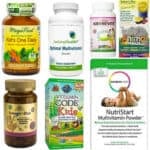
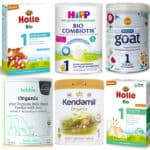



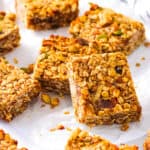




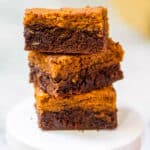


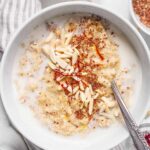
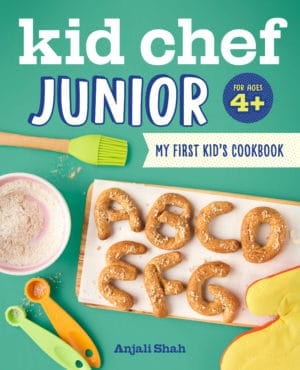


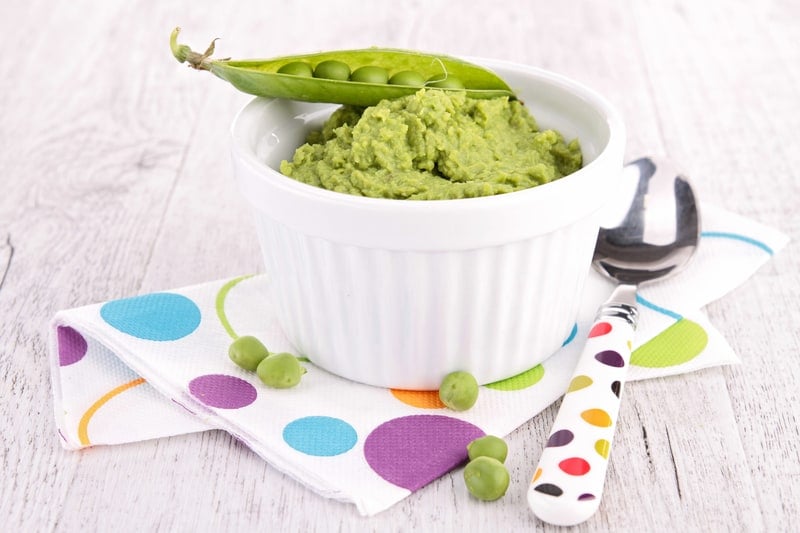



Hi Anjali! Your posts have been so helpful for a confused mama like me! My LO just turned 8 months. I’ve noticed my supply dramatically decrease the last few weeks. I’d like to start supplementing with formula and wondering what your thoughts are for using both Kabrita and Hipp Dutch 2 interchangeably or mixing both for nutritional benefits? I’ve read some articles about people mixing the cow and goat milk Holle formulas for this purpose. Appreciate your thoughts and insight!
Hi Debbie! I’m so happy my blog has been helpful for you! To your question – I think it probably would be fine to use both Kabrita and HiPP Dutch Stage 2 — there are some slight differences between the two nutritionally (which I outline in this post) so I can’t see any issue with combining them to get the benefits of both!
My 3 month old was strickly breastfed. I ate diary while pregnant and while breast-feeding. My supply is runny low so i introduced a goat milk formula that i made for my other son. My son broke out on his face and red around the eyes. It couldnt be dairy allergy…. right? Since i have been eating dairy already for breastmilk. Im lost.
Hi Stephanie! If you were eating dairy while you were breastfeeding and your son was fine, then it likely isn’t the dairy. My guess is it’s something in the goat milk formula that’s bothering him. I would try a formula like HiPP PRE or Loulouka which are both super gentle and free of any irritants and see how one of those works for him!
My 9 week old is fine drinking his formula but I find while he’s trying to sleep or later in the afternoon he starts to kick and wriggle and cry which stops him and myself from having a good night sleep. Would switching formula to a goat’s milk base be more gentle and help with his tummy?
Hi Kara! It’s not clear to me that your 9 week old is actually having tummy troubles since it sounds like he wriggles and cries long after he has actually drunk his bottle of formula and has fallen asleep for a while — is that right? If so, it’s pretty normal for 9 week old babies to wake frequently throughout the day and night (sometimes as frequently as every 2 hours). But if your baby drinks formula and then within an hour is super uncomfortable, gassy, spitting up, crying, fussy, etc. then there might be an allergy issue that you should talk to your pediatrician about looking more into. If you can describe your baby’s typical eating, waking, sleeping schedule in a 24 hour period I can let you know if that sleep/wake schedule is normal for his age or not! Hope that helps!
Help! I have a newborn and have been feeding her Holle goat since day 3. This is what I gave my now 2 y.o., but I’ve heard conflicting things lately that have me a little worried! Should I be concerned with folic acid (per the ped), iron and vitamin B levels (or lack thereof) in Holle goat? I’d prefer a formula where I didn’t have to supplement these things on top of the formula. Does Kabrita have these things? Their website says from 1 year and on, but I’ve seen you say it’s ok for babies?? If it is ok from birth, which specific Kabrita should I get?
Thank you so much!
Hi Dana! If your pediatrician is concerned about the folic acid levels in Holle Goat then I wouldn’t use that for your infant. Every baby is different, and your pediatrician knows best the nuances of what your baby might need. Kabrita does have adequate levels of folic acid, iron and Vitamin B levels — you can see their nutritional info here. I’d show this to your pediatrician and see if they’re comfortable with you using this formula for your baby. Their website says it’s a toddler formula but it meets the nutritional requirements for an infant formula (per the FDA) — so as long as your pediatrician is comfortable with it, you should be able to use this version of Kabrita for your baby. Hope that helps!
Hello
I still want to breastfeed my 5 month old son, but I do not always have time to pump at work. What are your thoughts on mixing the breast milk with the goat milk formula; half and half?? Thank you
Hi Dani! You can totally do that! The only thing is, if you do mix breastmilk and formula, your baby has to finish both within 2 hours (since formula is only good for 2 hours after mixing it) — whereas breastmilk can sit at room temperature for 4 hours before it goes bad. So if your baby isn’t good about finishing bottles, I’d give him the breastmilk first, and then follow up with a bottle of formula instead of mixing the two, just so none of your breastmilk accidentally goes to waste! I hope that helps, let me know if you have any other questions!
I need help please ASAP!! I am a new mom and am scared about everything. My daughter is on Hipp stage 1 and she was doing fine now her stool is like clay form and for the last couple days she had pimples on her face I thought it was heat rash but they are still on there.
Hi Christine!! First of all, congratulations on the birth of your little one! I know becoming a new mom is overwhelming and scary at times but you’re doing great! As for your daughter — the pimples on her face could be baby acne and totally unrelated to the formula. But for her stool — how long was she on HiPP Stage 1 before her stool changed? And how did you transition her to HiPP? There could be a bunch of reasons for the stool changes + pimples — but without more information it’s hard for me to tell you what might be going on. What I’d suggest is taking her to your pediatrician and asking them the following questions:
1) Are the pimples on her face baby acne and will resolve on their own, or are they indicative of an allergy or something else?
2) Ask their advice about her stool changes, and get some information on milk protein allergies to see if that might be the cause
Hope that helps! Let me know if there is anything else I can answer for you!
My 5 month old is only breastfed but I’m trying to transition her into a formula before my freezer stash runs out, I started her on Similac Advance and she had a severe allergic reaction and was admitted in the ER, I followed up with her pediatrician and she suggested maybe she was allergic to the cows milk protein cause my 2 year had the same reaction but with enfamil and with my 2 year old I was able to keep on breastfeeding but my milk supply is really low now and she suggested I try “goat milk meyenberg whole powdered” cause she doesn’t know what else to suggest cause most formulas she said have cows milk proteins. What do you suggest I do? I don’t even know what to do anymore..
Hi Abigail! I’m so sorry to hear about your daughter’s reaction – that must have been so stressful! I’m actually surprised your pediatrician suggested “goat milk meyenberg whole powdered” — because that’s literally just powdered whole goat milk – it’s not goat milk formula or anything. And just like cow’s milk, whole goat milk should be avoided before the age of 1. I’d actually recommend trying HiPP Comfort which is a hydrolyzed formula and made for babies with milk protein allergies. If that doesn’t work you might have to try an amino acid based formula like Neocate. But I’d definitely try HiPP Comfort first! You can see more details about healthy hypoallergenic formula options here. Hope that helps!
Sorry I meant to put the goat milk formula. I don’t if that would have made a difference lol but she recommended trying the “whole powdered goats milk” formula meyenbergs brand. I’m not sure if that’s different..
I think your pediatrician is confused — Meyenbergs only makes whole powdered goat’s milk — they don’t make formula haha! 🙂 I’d go back and show your pediatrician their product label so that they can see that it’s not actually formula 🙂
So she got some labs done and turns out she’s allergic to cows milk and soy milk.. what would you recommend I do in this situation? Im so lost.
Hi Abigail! Oh man that’s tough! You can try goat milk formula to see if that helps, but if it’s a milk protein allergy you might need to go with a hypoallergenic formula like HiPP Comfort, and if that doesn’t work, then you’ll have no choice but to go to Alimentum or Neocate depending on the severity of her allergy. I’d also talk to your pediatrician about what they think is best among all of these options! Hope that helps, let me know if you have any other questions!
Do you know of any other goat milk that is for 6 month olds? So far I’ve found Kabrita but it says it’s for 12-24 months.
Hi Abigail! Kabrita is marketed as a toddler formula, but it actually meets the nutritional requirements of an infant formula, and I know lots of moms who use Kabrita for their 6 month olds. If your pediatrician is ok with it, you should be fine to use Kabrita for your little one! So I’d just get their opinion first!
So Kabrita doesn’t have Cows milk or Soy in it? Just to make sure?
Hi Abigail! That’s partially correct 🙂 Kabrita has no cow’s milk, it’s 100% goat milk. It does have soybean oil as part of the fats added to resemble breastmilk — but it doesn’t have soy milk added. However, for a baby with a soy allergy, the soybean oil could be an issue depending on the severity of the allergy. Hope that helps!
The labs said she was very allergic to cows milk BUT the doctor said that she was very low positive allergic to soy milk so she suggested to still try something with soy to see how she would react to it but I was a bit hesitant to it.. I am going to ask her about it on Monday to see if Kabrita would be a good fit for her thank you!
Ah I see! Yes definitely ask about Kabrita then – hope that works for her!!
Hello,
My daughter is 4 months old and we have been supplementing with Holle Goat. She’s been doing great on it but at her 4 month we’ll check our pediatrician told us that goat milk could cause anemia and kidney failure. It really scared us. Should I switch to cow formula?
Hi Krista! I would clarify whether your pediatrician meant straight goat’s milk, or goat’s milk formula. Because there is a big difference between the two! Regular goat’s milk is just like regular cow’s milk in that it’s not recommended to give to babies before the age of 1 year (for the reasons your pediatrician mentioned). But goat’s milk formula is made to be nutritionally complete and safe for infants. So I would go back to them and clarify that they didn’t mean goat’s milk formula — and if they did then I’d ask what they’re basing that assessment on to get more info!
My son is on nanny care but I am thinking of switching over to hipp Dutch. When I am feeding him he is so hungry, his belly constants grumbles, even though I am feeding every 3 hrs about 6 oz. could the nanny care not be filling enough due to the protein ratio?
Hi Skylar! It’s possible your son may just need to eat more, because Nanny Care has the same calories and protein per 100ml as HiPP Dutch does! Both have 66 calories and 1.3g protein per 100ml! Although I like HiPP Dutch better than Nanny Care for a number of reasons (Nanny Care isn’t organic, they don’t have a whey-casein ratio as close to breastmilk as HiPP, they don’t have DHA or prebiotics added, and they have two synthetic ingredients added!)
Hello, I love reading your articles & they have been very helpful! I just wanted to know what you thought about switching from Holle goat to Kabrita? I breastfeed her about 2-3 oz & have to supplement Another 1-2 at times. she does well on holle, she spits up sometimes, has a bit of Colic & sometimes her poo is pasty!
Hi! I would recommend switching! Babies tend to have more digestive issues on Holle Goat than Kabrita – I have heard of the constipation/pasty poop issues before with Holle Goat. Kabrita has a more gentle whey/casein ratio so you shouldn’t have that issue with Kabrita!
Hi again! So we did switch to kabrita & baby seems to be doing well! Only few concerns, she won’t eat more than 2oz of it (she sometimes has 2oz breast then 2oz formula, but even when just formula she only has 2)before she wants to push the bottle out, she spits up every other feed, not too much, is a bit gassy. She has been gaining weight & the dr says she looks healthy so we’re not too sure what to do. We thought about switching to a HIPP formula not sure which, or don’t know if to stay on kabrita
Hi Denay! Glad to hear Kabrita is going well! Is your doctor concerned about your baby spitting up after 2oz of formula? Spitting up is pretty normal as long as your baby isn’t throwing up large quantities of formula all the time, or is uncomfortable during eating/not gaining weight/etc. Gassiness is also common/normal in babies from time to time – as long as again, there aren’t signs of distress or an allergy. And 4oz total is pretty normal for a feed. So it could just be that she’s full! If she’s only drinking formula and doesn’t want more than 2oz at a time, that would be a bit surprising. What you could try to do is, since she doesn’t actually have a diagnosed allergy, is try 1 can of HiPP Dutch and alternate between that, Kabrita, and breastmilk if you have some to see how she does on each. I’d also recommend ordering HiPP Dutch from Huggable because if it doesn’t work, you can switch it for HiPP HA at that point and Huggable will switch it for you for free! Hope that helps!
Hello! I recently switched my 3 month old from cows milk formula to goat (Holle) and he has been doing better (less painful gas, etc.) but i am concerned about different articles talking about the high protein and possible kidney damage. I see that some suggest diluting the formula. Should I be concerned or trust that Holle formula has balanced it out appropriately? Thank you!!
Hi Riley! I’m glad your son is doing better on Holle Goat! That’s great! Regarding the high protein content — did you find an article talking about goat milk formula having too much protein? Or goat milk itself having too much protein for babies? Because Holle Goat has about the same amount of protein per serving as a cow’s milk formula. Holle Goat has 1.5g protein per 100ml, and HiPP UK Stage 1 has 1.25g protein per 100ml. I would double check with your pediatrician to make sure that amount of protein is fine for your little one, and as long as they are comfortable I’d just keep using Holle Goat as is (not diluted!). Hope that helps!
Can I feed my 1 month old Kabrita USA? The container says it’s for 12-24months.
Hi Amanda! I know lots of moms who have used Kabrita USA for their infants, because it is nutritionally complete for infants. Here’s what Kabrita says about the “toddler” designation: “In the US, the FDA has a number of important requirements that must be completed before a company may market their formula as an infant product. Although our toddler formula meets the FDA nutrient requirements for infant formula, we do not recommend it as the only source of nutrition for either infants or toddlers.” — so given that, I think if your pediatrician is ok with it, it should be fine to give your infant Kabrita!
Would you recommend Kabrita Toddler Formula for a 6 month old (4 months adjusted)? Or should I look at one of the other options? I will also ask my pediatrician but would love to know your view.
Hi Jessica! Kabrita USA is nutritionally complete for infants, so if it were my baby I’d feel comfortable using Kabrita for them. For a goat milk formula, it is the cleanest option I have found. But yes, make sure your pediatrician is on board before you use it for your baby!
I’m about to have my 4th baby-my other 3 all had issues with formula. The first 2 had to drink Similac Alimentum, and my 3rd (the easiest so far) drank the Similac for gas and fussiness. How ever, she struggled with constipation and passing gas. I would really like to skip all the issues and start out on a goats milk formula from the get-go. How do you feel about that? I don’t want to create an intolerance where there may not be one, but I also don’t want to go through the horrors I did with my other 3 children. In the past I’ve received WIC as well, and I know we’ll be paying out of pocket if we go the goat formula route-but I just want a happy, healthy baby.
Hi Heather! Congrats on your 4th little one (coming soon! 🙂 ). To your question, you can certainly start with a goat milk formula – or you can do goat milk some of the time and cow’s milk some of the time just to give your baby experience with both (and then you can compare their reactions between the formulas). Since all babies are different, there’s no real way to know what your newest will need — they may be totally fine with a cow’s milk formula. That said, even babies who don’t have cow’s milk intolerances can have issues on Similac and some of the standard, non-organic, US based formulas because of all of the synthetic ingredients included in those formulas. But I know lots of moms who start out with goat milk formula and just stick with that the whole time. So if your pediatrician is ok with that and you can afford it then there’s no reason not to do that! And if you need some of the WIC support, then you could do the half and half (half of the bottles your baby gets can be standard WIC-supported formula, and half can be goat milk to save money). Also, once you start solids you can give your baby cow’s milk products (via cheese, yogurt, etc.) – so your baby can still get exposed to cow’s milk early on. Hope that helps, let me know if you have any other questions!
My baby had eczema from cow milk and started her on hypoallergic formula since sge was 2 months and now she is 6 months the issue she hates it she did not increase the amount and she is always hungry due to hydrolyzed protein do you think goat milk it will help
Hi Lyze! So sorry to hear your daughter has been struggling with eczema and doesn’t like the hypoallergenic formula options! I think it doesn’t hurt to try goat milk formula as long as your pediatrician is comfortable with it. You can also try some of these natural remedies for eczema that might help your daughter regardless of which formula you go with!
Hello,
Is it true that it is better to get formula from overseas (UK/Germany/etc.) due to their higher agricultural/GMO standards? For example, we are using the Holle brand Goat milk formula from Germany. It is more expensive and takes longer to arrive.. but if it’s a better option then we’re of course happy to do it. Thoughts/comments about this? Thanks for your input!
Hi Jon! It depends on the formula honestly! For all cow’s milk formulas, the UK/EU versions are far superior to the US versions. You can see more info on that here. But for goat milk formula, Kabrita USA is actually superior to Holle — and you can see more details on why that’s the case here. Hope that helps! Let me know if you have any other questions!